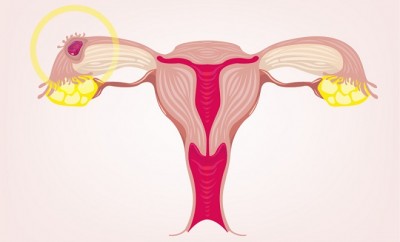Quiz: Implantation Bleeding or Menstrual Period
Implantation bleeding is blood discharge from the vessels of uterine mucous membrane, which were affected due to implantation of the embryo. A period is monthly bleeding, evoked by the alteration (regeneration) of the uterine mucus. In order to be able to tell implantation bleeding from a period before a pregnancy test can be taken, you can take the quiz, provided below the article. For accurate investigation into the cause of bleeding, it is required to visit a doctor.
How does implantation of the embryo take place?
Implantation bleeding (IB) is the discharge of a little amount of blood through the vagina. It is associated with the affection of the vessels of uterine mucous lining (endometrium) due to implantation (invasion) of the ovum.
A special organ-area, the so-called trophoblast starts forming in the already fertilized egg. It starts producing bioactive substances, which “dissolve” the endometrial surface. It has to do with the fact that it is easier for the fetus to “adhere” to the slightly affected surface of endometrium – the newly formed erosion, rather than to the intact epithelium of the uterine mucous lining. This is the course of the first phase of implantation – the so-called adhesion.
After it, the “fixed” embryo starts rapidly invading the endometrial thickness, while the affected surface above it, begins to heal. Implantation occurs approximately on the sixth day after ovulation, whereas the healing process lasts for another week.
Thus, IB, discharge of blood from the vessels, which had been affected during the invasion, might occur from the 20th to the 27th day of the cycle (assuming that a normal cycle consists of 28 days).
What is the period caused by?
The menstrual cycle is rather a complex endocrine process. It is based on regular preparation of female organism to pregnancy. These preparations are about the interchange of levels of various hormones, which first provoke maturation and detachment of the ovum, and also make a favorable environment for its development, stimulating the growth and increased nutrition of endometrium. Then, in case fertilization does not take place, they consider the proliferative mucous lining to be “unfit for the occupation” and launch the process of its necrosis with subsequent excretion. Menstruation is physiological bleeding, which is caused by the rejection of endometrium, compensated by proliferation of the mucous membrane, which takes place on a monthly basis.
The menstrual cycle normally consists of 21-35 days, counting from the first day of the period. 2-3 years after the first period (menarche), a healthy woman obtains a certain cycle, and she is able to calculate the time of the next period with a precision of 1-2 days.
Implantation bleeding or period quiz
As it is yet too soon for taking a pregnancy test when you see implantation bleeding, in case the blood discharge gives you some doubts regarding its cause, then you would better take some time to reflect and answer a few questions:
- How does it look?
- When did this discharge appear?
- How long does bleeding last?
- What is it accompanied by?
Answering the first question is fairly is easy – you should just carefully examine your underwear or the sanitary pad. A period has the form of moderate or profuse discharge of scarlet or dark-red blood, possibly containing clots. It can be rather heavy at the beginning, transforming into insignificant “spotting” for a few last days.
On the other hand, IB is quite scant at the beginning. It might be a just few spots, usually dark-brown or light-pink. In both cases the color of discharge is conditioned by quite a little amount of blood (in case of normal implantation there is little blood indeed). However the secrete may have a light-pinkish coloring due to being heavily diluted with mucus.
The second question shall not present any difficulty for women who run a regular cycle and maintain a careful record of it. As it has already been said, IB takes place approximately on the 20th day of the 28-day cycle. In case your cycle is shorter or more extended, then you should just add or subtract the difference, as the day of ovulation, which normally occurs in the middle of the cycle, also changes in line with the cycle’s duration. Menstruation should be expected to occur in the period, which is usual for you, i.e. by the end of a regular cycle.
Continuance of bleeding may also be indicative to its reason. If your period usually lasts a week, and this time the scant discharge got by in three days, then you might consider chances of implantation.
The answer to the fourth question is what you actually feel. Cramps, dragging back pain and irritability are typical to a period, while fatigue, taste disturbances and morning sickness are classical early pregnancy symptoms.
Unfortunately, taking such a “quiz” is not enough: some women usually see very little menstrual discharge, and it may be easily confused with IB, other women have irregular cycles, and others might experience sickness during each period. These are all individual factors. Apart form this, abdominal distention, that overlaps with implantations, may easily be taken for a cramping pain, which accompanies monthly bleeding.
You should also keep in mind, that apart from IB and menstruation, there are many other causes of blood discharge, specifically:
- Ovulatory bleeding;
- Disturbance of a normal pregnancy;
- Ectopic pregnancy;
- Burst and torsion of uterine appendages cysts or the uterine appendages;
- Oncology of the uterus and the uterine cervix;
- Hormonal disturbances;
- Sexually transmitted diseases;
- And many others.
It can be concluded that, the statement, as if the pregnant woman might still have one last pregnancy is nothing but a myth. If anyone brings forward such a fact, she has most probably encountered undiagnosed IB. In case blood discharge, following an unprotected intercourse gives you some doubts, you should properly distinguish between implantation bleeding and a period. In order to do this, you should see a doctor, who will prescribe optimal analyses and an ultrasound investigation.













